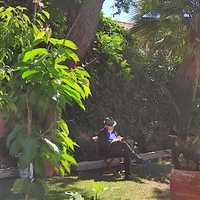
Tamara Borovica
Dr Tamara Borovica (she/her) has recently joined Social and Global Studies Centre to work on a Linkage Project exploring Borderline Personality as a social phenomenon. Tamara’s doctoral thesis offered a creative exploration of the embodiment of womanhood, and was awarded Doctoral Research Award for best doctorate in the field of Philosophy of Education by Melbourne Graduate School of Education, The University of Melbourne. Tamara’s research focuses on embodiment, gender, innovative and arts-based research methodologies, interdisciplinary and critical approaches to health, well-being and belonging. Her expertise is in embodied and arts-based methods for participatory research inclusive of non-normative ways of knowing.
Tamara also runs creative movement and embodiment classes to explore links between movement, embodiment, creativity, belonging and well-being. Her interests are intersections between creative practice, philosophy, arts, social sciences and compassionate action in the everyday.
Tamara also runs creative movement and embodiment classes to explore links between movement, embodiment, creativity, belonging and well-being. Her interests are intersections between creative practice, philosophy, arts, social sciences and compassionate action in the everyday.
less
Related Authors
Michele Wallace
City College of New York
Andrea Peto
Central European University
Deborah Tolman
Hunter College, CUNY
Amy Shields Dobson
Curtin University, Perth
Shilpa Phadke
Tata Institute of Social Sciences
Stephen Whittle
Manchester Metropolitan University
Francisco Vazquez-Garcia
Universidad de Cadiz
Deniz Yonucu
Newcastle University
Lucas R . Platero
Universidad Rey Juan Carlos
Roberto G. Gonzales
University of Pennsylvania
InterestsView All (12)










Uploads
Papers by Tamara Borovica
In doing so, we apply an embodied, autoethnographic style of inquiry to explore our personal embodiment of identities as mind- ful dance and movement teachers and the ways they influence and relate to a larger teaching field and to broader socio-political frames. Through this, we arrive at an understanding of how self- reflexivity can unfold a relational and empathic awareness of both the effects of stratification and for different possibilities, which helps to create a vital in-between space where more authentic possibilities for diversity and inclusion can manifest.
In doing so, we apply an embodied, autoethnographic style of inquiry to explore our personal embodiment of identities as mind- ful dance and movement teachers and the ways they influence and relate to a larger teaching field and to broader socio-political frames. Through this, we arrive at an understanding of how self- reflexivity can unfold a relational and empathic awareness of both the effects of stratification and for different possibilities, which helps to create a vital in-between space where more authentic possibilities for diversity and inclusion can manifest.